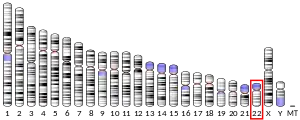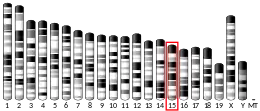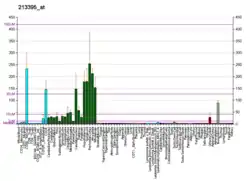MLC1
Membrane protein MLC1 is a protein that in humans is encoded by the MLC1 gene.[5][6]
MLC1 (also called WKL1[7][8]) is the only human gene currently associated with megalencephalic leukoencephalopathy with subcortical cysts (MLC).[9] Evidence exists for at least one other gene for MLC, but it has not been mapped or identified.
Function
The function of this gene product is not known; however, homology to other proteins suggests that it may be an integral membrane transport protein.[7] Mutations in this gene have been associated with megalencephalic leukoencephalopathy with subcortical cysts, an autosomal recessive neurological disorder.[9]
The MLC1 protein contains six putative transmembrane domains (S1–S6) and a pore region (P) between S5 and S6. Furthermore, MLC1 has highest homology with the KCNA1 shaker-related voltage-gated potassium channel (Kv1.1). This analysis suggests that MLC1 may be a cation channel.[7]
References
- GRCh38: Ensembl release 89: ENSG00000100427 - Ensembl, May 2017
- GRCm38: Ensembl release 89: ENSMUSG00000035805 - Ensembl, May 2017
- "Human PubMed Reference:". National Center for Biotechnology Information, U.S. National Library of Medicine.
- "Mouse PubMed Reference:". National Center for Biotechnology Information, U.S. National Library of Medicine.
- Nomura N, Miyajima N, Sazuka T, Tanaka A, Kawarabayasi Y, Sato S, Nagase T, Seki N, Ishikawa K, Tabata S (1994). "Prediction of the coding sequences of unidentified human genes. I. The coding sequences of 40 new genes (KIAA0001-KIAA0040) deduced by analysis of randomly sampled cDNA clones from human immature myeloid cell line KG-1". DNA Res. 1 (1): 27–35. doi:10.1093/dnares/1.1.27. PMID 7584026.
- Leegwater PA, Yuan BQ, van der Steen J, Mulders J, Könst AA, Boor PK, Mejaski-Bosnjak V, van der Maarel SM, Frants RR, Oudejans CB, Schutgens RB, Pronk JC, van der Knaap MS (April 2001). "Mutations of MLC1 (KIAA0027), encoding a putative membrane protein, cause megalencephalic leukoencephalopathy with subcortical cysts". Am. J. Hum. Genet. 68 (4): 831–8. doi:10.1086/319519. PMC 1275636. PMID 11254442.
- Meyer J, Huberth A, Ortega G, Syagailo YV, Jatzke S, Mössner R, Strom TM, Ulzheimer-Teuber I, Stöber G, Schmitt A, Lesch KP (May 2001). "A missense mutation in a novel gene encoding a putative cation channel is associated with catatonic schizophrenia in a large pedigree". Mol. Psychiatry. 6 (3): 302–6. doi:10.1038/sj.mp.4000869. PMID 11326298.
- McQuillin A, Kalsi G, Moorey H, Lamb G, Mayet S, Quested D, Baker P, Curtis D, Gurling HM (August 2002). "A novel polymorphism in exon 11 of the WKL1 gene, shows no association with schizophrenia". Eur. J. Hum. Genet. 10 (8): 491–4. doi:10.1038/sj.ejhg.5200837. PMID 12111645.
- "Entrez Gene: MLC1 megalencephalic leukoencephalopathy with subcortical cysts 1".
Further reading
- Nakajima D, Okazaki N, Yamakawa H, et al. (2003). "Construction of expression-ready cDNA clones for KIAA genes: manual curation of 330 KIAA cDNA clones". DNA Res. 9 (3): 99–106. doi:10.1093/dnares/9.3.99. PMID 12168954.
- Nomura N, Miyajima N, Sazuka T, et al. (1995). "Prediction of the coding sequences of unidentified human genes. I. The coding sequences of 40 new genes (KIAA0001-KIAA0040) deduced by analysis of randomly sampled cDNA clones from human immature myeloid cell line KG-1 (supplement)". DNA Res. 1 (1): 47–56. doi:10.1093/dnares/1.1.47. PMID 7584028.
- Kawai T, Nomura F, Hoshino K, et al. (1999). "Death-associated protein kinase 2 is a new calcium/calmodulin-dependent protein kinase that signals apoptosis through its catalytic activity". Oncogene. 18 (23): 3471–80. doi:10.1038/sj.onc.1202701. PMID 10376525.
- Dunham I, Shimizu N, Roe BA, et al. (1999). "The DNA sequence of human chromosome 22". Nature. 402 (6761): 489–95. Bibcode:1999Natur.402..489D. doi:10.1038/990031. PMID 10591208.
- Leegwater PA, Boor PK, Yuan BQ, et al. (2002). "Identification of novel mutations in MLC1 responsible for megalencephalic leukoencephalopathy with subcortical cysts". Hum. Genet. 110 (3): 279–83. doi:10.1007/s00439-002-0682-x. PMID 11935341. S2CID 52319912.
- Zhang D, Li F, Weidner D, et al. (2002). "Physical and functional interaction between myeloid cell leukemia 1 protein (MCL1) and Fortilin. The potential role of MCL1 as a fortilin chaperone". J. Biol. Chem. 277 (40): 37430–8. doi:10.1074/jbc.M207413200. PMID 12149273.
- Ben-Zeev B, Levy-Nissenbaum E, Lahat H, et al. (2002). "Megalencephalic leukoencephalopathy with subcortical cysts; a founder effect in Israeli patients and a higher than expected carrier rate among Libyan Jews". Hum. Genet. 111 (2): 214–8. doi:10.1007/s00439-002-0770-y. PMID 12189496. S2CID 25452424.
- Strausberg RL, Feingold EA, Grouse LH, et al. (2003). "Generation and initial analysis of more than 15,000 full-length human and mouse cDNA sequences". Proc. Natl. Acad. Sci. U.S.A. 99 (26): 16899–903. Bibcode:2002PNAS...9916899M. doi:10.1073/pnas.242603899. PMC 139241. PMID 12477932.
- Rubie C, Lichtner P, Gärtner J, et al. (2003). "Sequence diversity of KIAA0027/MLC1: are megalencephalic leukoencephalopathy and schizophrenia allelic disorders?". Hum. Mutat. 21 (1): 45–52. doi:10.1002/humu.10145. PMID 12497630. S2CID 41349460.
- Gevaert K, Goethals M, Martens L, et al. (2004). "Exploring proteomes and analyzing protein processing by mass spectrometric identification of sorted N-terminal peptides". Nat. Biotechnol. 21 (5): 566–9. doi:10.1038/nbt810. PMID 12665801. S2CID 23783563.
- Saijo H, Nakayama H, Ezoe T, et al. (2003). "A case of megalencephalic leukoencephalopathy with subcortical cysts (van der Knaap disease): molecular genetic study". Brain Dev. 25 (5): 362–6. doi:10.1016/S0387-7604(03)00006-8. PMID 12850517. S2CID 20304086.
- Patrono C, Di Giacinto G, Eymard-Pierre E, et al. (2004). "Genetic heterogeneity of megalencephalic leukoencephalopathy and subcortical cysts". Neurology. 61 (4): 534–7. doi:10.1212/01.wnl.0000076184.21183.ca. PMID 12939431. S2CID 43645063.
- Tsujino S, Kanazawa N, Yoneyama H, et al. (2004). "A common mutation and a novel mutation in Japanese patients with van der Knaap disease". J. Hum. Genet. 48 (12): 605–8. doi:10.1007/s10038-003-0085-4. PMID 14615938.
- Ota T, Suzuki Y, Nishikawa T, et al. (2004). "Complete sequencing and characterization of 21,243 full-length human cDNAs". Nat. Genet. 36 (1): 40–5. doi:10.1038/ng1285. PMID 14702039.
- Gorospe JR, Singhal BS, Kainu T, et al. (2004). "Indian Agarwal megalencephalic leukodystrophy with cysts is caused by a common MLC1 mutation". Neurology. 62 (6): 878–82. doi:10.1212/01.wnl.0000115106.88813.5b. PMID 15037685. S2CID 6463695.
External links




